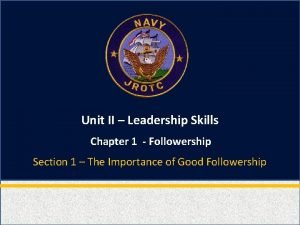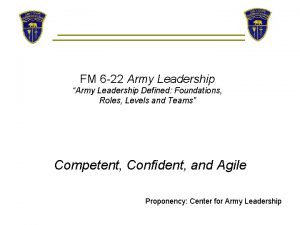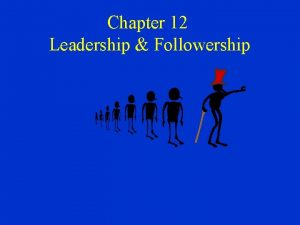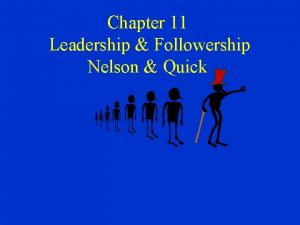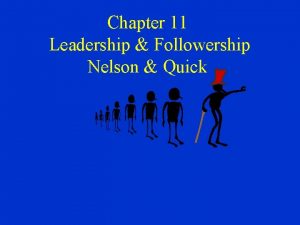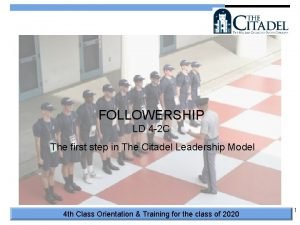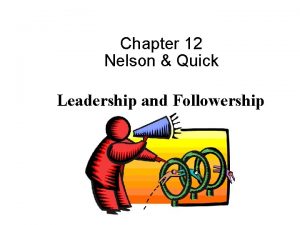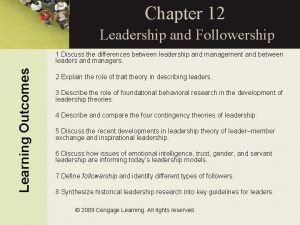Chapter 1 Leadership and Followership Leadership is the


















- Slides: 18

Chapter 1 Leadership and Followership

Leadership is the ability to influence the behavior of others.

Followership • Separate from leadership • Reciprocal roles • Active roles

Becoming a Follower • • Make suggestions Be supportive of others Listen carefully Continue to learn

Leadership Theories • Trait theories – Intelligence – Initiative – Creativity – Risk-taking

Behavioral Theories • Concerned with what the leader does – Autocratic – Democratic – Laissez-faire

Comparison of Authoritarian, Democratic, and Laissez-Faire Leadership Styles Authoritarian Democratic Laissez-Faire Degree of Control High Control Moderate Control Little Control Assumption of Responsibility Leader Shared Abdicate Efficiency Very Efficient Less Efficient than Authoritarian Inefficient

Additional Styles • • Task vs. relationship Situational Transformational Moral

Qualities of a Leader • • • Integrity Courage Initiative Energy Optimism § Perseverance § Balance § Ability to handle stress § Self-awareness

Behaviors of a Leader • • • § Communicates skillfully Thinks critically § Sets goals Solves problems § Shares a vision Respects people § Develops self and others

Are You a Winner or a Whiner? A winner says • We have a real challenge here • I’ll give it my best • That’s great! • We can do it • Yes! A whiner says • This is really a problem • Do I have to? • That’s nice, I guess… • Impossible. It can’t be done. • Maybe…

Keys to Effective Management

Management • • • Decisional Interpersonal Informational

Interpersonal • • Networking Conflict negotiation and resolution Employee development Rewards and punishment

Decisional • • Employee evaluation Resource allocation Planning Job analysis and redesign

Informational • Spokesperson for staff and the organization • Monitoring activities of the units and work groups • Dissemination of information

Conclusion Every professional nurse needs leadership and followership skills to be effective.

Conclusion Different groups respond to different management styles.
 Jan ardui
Jan ardui Servant leadership vs followership venn diagram
Servant leadership vs followership venn diagram Jjdidtiebuckle
Jjdidtiebuckle The potter and rosenbach followership model
The potter and rosenbach followership model Follower readiness
Follower readiness Alienated followers
Alienated followers Army leadership requirement model
Army leadership requirement model 5 dimensions of courageous followership
5 dimensions of courageous followership Kellerman's typology of followers
Kellerman's typology of followers Dynamic followership
Dynamic followership Transformational vs transformative leadership
Transformational vs transformative leadership Hình ảnh bộ gõ cơ thể búng tay
Hình ảnh bộ gõ cơ thể búng tay Lp html
Lp html Bổ thể
Bổ thể Tỉ lệ cơ thể trẻ em
Tỉ lệ cơ thể trẻ em Gấu đi như thế nào
Gấu đi như thế nào Tư thế worm breton
Tư thế worm breton Chúa sống lại
Chúa sống lại Các môn thể thao bắt đầu bằng từ đua
Các môn thể thao bắt đầu bằng từ đua




